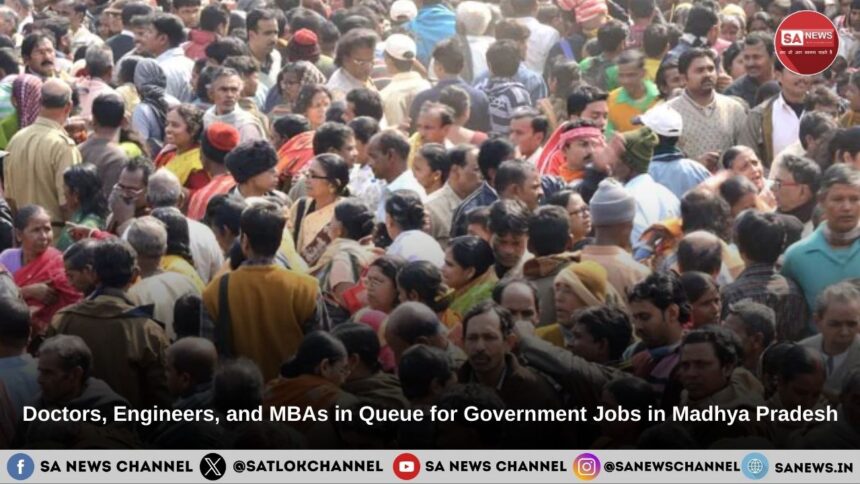Madhya Pradesh is witnessing an extraordinary surge of interest in government employment from some of the country’s most highly educated professionals. Official figures presented in the state assembly have revealed that among the 2.568 million registered job seekers, there are 4,811 MBBS doctors, approximately 86,000 engineers, and about 18,800 MBA graduates.
- Assembly Session Brings Numbers into Focus
- ‘Aspirational Youth’ A Political and Social Narrative
- Government Jobs: A Symbol of Stability
- The Numbers Behind the Competition
- Why Professionals are Turning to Public Sector Jobs
- Opposition’s Concerns over Unemployment
- The Broader Implications for India’s Workforce
- A Wake-Up Call for Employment Policy
- Changing Destiny Through the Supreme Knowledge of Sant Rampal Ji Maharaj
The data, sourced from the state’s Skill Development and Employment Department, highlights a growing concern even those with advanced degrees and professional qualifications are increasingly turning towards the public sector in search of stable career opportunities.
Assembly Session Brings Numbers into Focus
The statistics came to light during a recent session of the Madhya Pradesh Legislative Assembly. Congress MLA Bala Bachchan sought details about the educational qualifications of registered job seekers across the state.
In his response, Minister of State for Skill Development and Employment, Gautam Tetwal, presented the figures and offered a perspective on how the government views this segment of the workforce. Interestingly, Tetwal avoided categorising them as “unemployed,” instead using the term “aspirational youth” to describe those awaiting government postings.
‘Aspirational Youth’ A Political and Social Narrative
By adopting the term aspirational youth, the state government appears to be framing the issue as one of ambition rather than economic distress. This narrative suggests that these individuals are not necessarily without work, but are seeking better and more secure employment, primarily in the public sector.
However, critics argue that such terminology risks downplaying the reality of underemployment and the scarcity of high-paying, stable jobs in the private sector, particularly for fresh graduates and even seasoned professionals.
Government Jobs: A Symbol of Stability
For decades, government employment in India has been associated with job security, steady income, pensions, and social prestige. In states like Madhya Pradesh, where private sector growth has been uneven and often concentrated in specific industries or cities, government jobs remain the most sought-after career path.
This preference persists even among MBBS doctors, engineers, and MBA graduates, despite the availability of private sector roles in hospitals, IT companies, and corporate firms. Many believe that government positions offer greater long-term security, predictable working hours, and social respect factors that outweigh the sometimes higher salaries of private employment.
The Numbers Behind the Competition
Breaking down the official data:
- Total registered job seekers: 25,68,989
- MBBS doctors: 4,811
- Engineers: 86,048
- MBA graduates: 18,827
These numbers are not only a reflection of the state’s education levels but also of its employment preferences. The presence of thousands of doctors and engineers in these lists indicates that government recruitment drives are attracting talent across professional sectors.
Why Professionals are Turning to Public Sector Jobs
Experts suggest several reasons behind this trend:
1. Job Security – Government employment is insulated from many of the uncertainties of the private sector, including layoffs, economic downturns, and mergers.
2. Work-Life Balance – Public sector roles often come with fixed working hours, allowing professionals to maintain a better balance between personal and professional life.
3. Post-Retirement Benefits – Pension schemes and retirement benefits remain a strong incentive.
4. Social Status – In many parts of India, a government employee is regarded with high respect, regardless of salary.
Opposition’s Concerns over Unemployment
While the government’s terminology has shifted towards aspirational youth, opposition leaders view the figures as evidence of a deeper economic concern. Congress MLA Bala Bachchan expressed that the presence of thousands of highly qualified individuals in job seeker lists reflects limited opportunities and underutilisation of skilled talent in Madhya Pradesh.
The Opposition has called for policy interventions that not only expand public sector recruitment but also stimulate private sector growth and create new avenues for high-skilled employment.
The Broader Implications for India’s Workforce
The situation in Madhya Pradesh mirrors a nationwide pattern. Across India, underemployment remains a significant challenge, where individuals work in jobs below their qualification level or earn wages inadequate to match their skill sets.
The data from Madhya Pradesh acts as a microcosm of this broader issue, raising questions about the effectiveness of higher education in guaranteeing suitable employment and the need for a more diverse economic base that can absorb skilled workers.
A Wake-Up Call for Employment Policy
The figures from Madhya Pradesh’s job seeker database are more than just numbers; they represent a critical challenge for policymakers. When thousands of MBBS doctors, engineers, and MBA graduates line up for government jobs, it signals not only the enduring allure of public sector employment but also the limitations of the current job market.
If India is to fully leverage its demographic dividend, state and central governments must work together to strengthen both public and private sector employment opportunities. This means creating high-quality, skill-matched jobs, encouraging entrepreneurship, and ensuring that higher education translates into meaningful, rewarding careers.
Until then, the queues outside government recruitment offices in Madhya Pradesh may continue to grow lined with some of the country’s best and brightest minds, waiting for a stable place in the system.
Changing Destiny Through the Supreme Knowledge of Sant Rampal Ji Maharaj
The struggle for jobs shows how people depend on luck and opportunities but Tatavdarshi Sant Rampal Ji Maharaj reveals a truth beyond ordinary thinking. He explains that Kabir Saheb is the Supreme God, in whose divine dictionary the word impossible does not exist. When a seeker receives Satnam from the Complete Guru, the Almighty Himself transforms their destiny, granting them more than they could imagine ; in this world and beyond. For authentic spiritual knowledge that changes lives and fortunes, visit www.jagatgururampalji.org.
FAQs on Doctors, Engineers, and MBAs Queueing for Government Jobs in Madhya Pradesh
1. How many job seekers are currently registered in Madhya Pradesh?
According to official figures presented in the Madhya Pradesh Legislative Assembly, a total of 2,568,989 job seekers are registered in the state, spanning diverse educational backgrounds.
2. How many MBBS doctors, engineers, and MBA graduates are among them?
The data shows 4,811 MBBS doctors, 86,048 engineers, and 18,827 MBA graduates registered for government job opportunities in Madhya Pradesh.
3. Why are highly qualified professionals opting for government jobs?
Professionals are drawn to public sector roles for job stability, retirement benefits, structured work hours, and social prestige, often preferring these over potentially higher-paying private jobs.
4. What terminology does the government use for these candidates?
The Madhya Pradesh government refers to them as “aspirational youth” rather than “unemployed,” framing them as individuals seeking better roles rather than without work.
5. What does this trend indicate about employment in the state?
Experts see this as a sign of underemployment and a lack of robust private sector opportunities, underscoring the need for job creation policies targeting skilled professionals.









